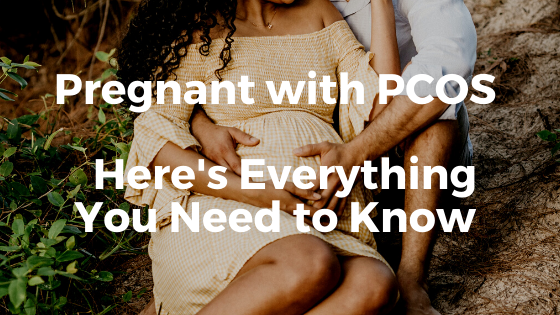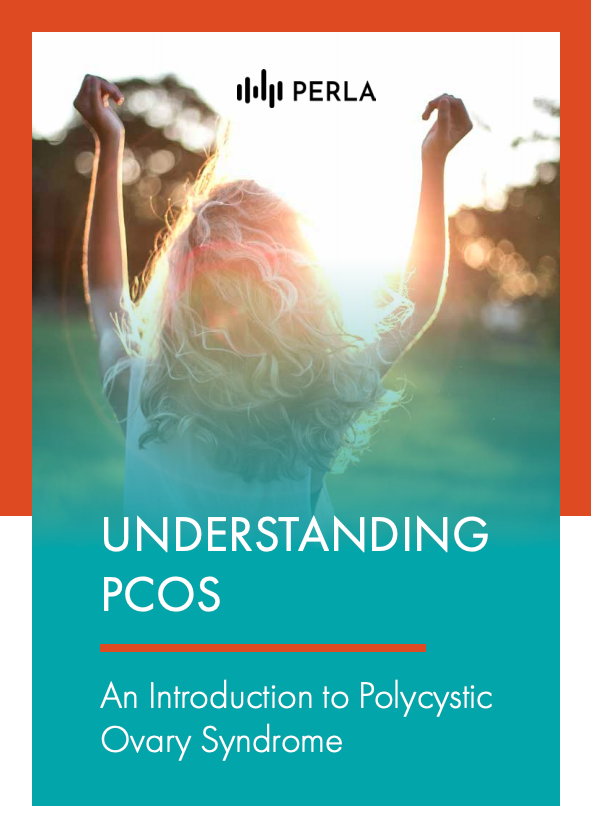For many women with PCOS, getting pregnant is a major step and a reason to celebrate! While the challenges of PCOS persist with pregnancy, there are measures you can take to increase your chances of a normal pregnancy. Especially during pregnancy, it’s essential to stay in close contact with your doctors and PCOS care team. Here are some first points about PCOS and pregnancy you may be interested in learning about, however your doctor and care team will know what will work best for you and your situation, so make sure you note down any questions you may have for the next visit.
Now let’s dive right in:
Does PCOS affect Pregnancy?
Pregnant women with PCOS need to be more alert than women without PCOS for possible complications. It is well-known that PCOS puts women at higher risk for complications during pregnancy and delivery.1 The two main complications that are associated with PCOS are increased risk for a miscarriage in early pregnancy and gestational diabetes.
Women with PCOS are three times more likely to experience a miscarriage in the first trimester of pregnancy than women without PCOS.2 Some women with PCOS may already have diabetes prior to pregnancy and many are vulnerable to gestational diabetes. The rate of C-section deliveries is also higher in women with PCOS.
However, the risk for some pregnancy complications can be prevented by maintaining a healthy weight and limiting the amount of weight gain before and during pregnancy.
Pregnancy Complications in Women with PCOS
A meta-analysis in 2006 found that PCOS can increase the risk of gestational diabetes, pregnancy-induced hypertension (PIH), preeclampsia, and preterm birth.4 This may also be connected to the fact that women with PCOS will most likely have other pre-existing medical conditions, such as hyperandrogenemia, hyperinsulinemia, and obesity.
Miscarriage or Early Pregnancy Loss
Several studies show an increase in the chance for miscarriage in women with PCOS, but other researchers attribute the increase to other factors such as obesity, increased age, and use of fertility treatments.5,6
In addition, women treated with ovulation-inducing medications may have a higher risk of spontaneous miscarriage compared with normally ovulating women.7 Metformin can be used to reduce miscarriage risk in pregnant women with PCOS. It is classified as a Category B drug, which means that it does not cause fetal abnormalities in animal studies. Make sure to check your treatment plan and all the medications and supplements you are taking with your doctor and care team.
Gestational Diabetes
Gestational diabetes mellitus (GDM) is an increase in the mother’s blood sugar levels during pregnancy, which typically resolves after the birth of the baby.8 However, there is a good chance that you will develop it again in future pregnancies. This type of diabetes usually occurs during the last half of pregnancy. Gestational diabetes is different from diabetes mellitus as the latter is more severe and does not go away after pregnancy.
In healthy women, blood insulin levels typically increase up to three times during pregnancy. The increase is about sevenfold in women with PCOS. Increased blood sugar in the mother can cause fetal anomalies and even miscarriage.
Infants of mothers with GDM are often larger than other babies, resulting in the need for cesarean delivery. Taking metformin before and after a pregnancy reduces the rate of GDM to 7 percent.
Preeclampsia
Pre-eclampsia is described as a dangerous rise in blood pressure during pregnancy, accompanied by swelling of the legs and the presence of protein in the urine. When left untreated it can turn into eclampsia, causing kidney and liver damage, seizures, and in rare cases, even death. Maintaining normal blood pressure is the most important preventive measure you can take. If you notice any change in your well-being during pregnancy, make sure to check in with your doctor and care team.
Pregnancy-Related High Blood Pressure (Gestational Hypertension)
This type of hypertension usually develops about halfway through the pregnancy. Unlike pre-eclampsia and eclampsia, there are no proteins excreted in the urine. Blood pressure often normalizes two to three months after delivery.
Lowering your high blood pressure, losing at least 10 percent of your weight if you are overweight or obese, and regular exercise can reduce your risk of developing gestational hypertension.
Preterm Birth
The rate of preterm delivery is increased in women with PCOS, particularly those with high androgen levels in the blood.9 The rate is higher by 67% for multiple pregnancies. Causes of preterm delivery are preterm labor, incompetent cervix, and hypertensive complications, among others.
Cesarean Delivery
The risk for pregnancy and neonatal complications are high in women with PCOS, which often leads to cesarean or C-section delivery. In an observational study involving 9,068 women with PCOS, 27.7% of PCOS births were delivered by cesarean section compared with 23.7% of controls.10 Birth through C-section has its own risks for both the mother and the baby.
Prevention and Management
Before becoming pregnant it’s important to prepare your body and keep it in a healthy condition. It may be difficult to take extra steps to improve your health, but it will greatly benefit the outcome of your pregnancy and your child’s well-being.
Recent findings suggest that following a healthy lifestyle reduces pregnancy-related complications in PCOS.11 It is advisable to stop drinking alcoholic beverages and, of course, to stop smoking if you are planning to conceive.
When you are pregnant, make sure to work closely with your doctors and PCOS care team, presumably, your obstetrician or fertility specialist, endocrinologist, and dietitian. Your healthcare providers will guide your medical care before, during and after your pregnancy journey. Check in with them any time you feel changes in your well-being, or have any questions or concerns, as they know you and your situation best.
Sources:
- Kjerulff LE, Sanchez-Ramos L, Duffy D. Pregnancy outcomes in women with polycystic ovary syndrome: a meta-analysis. Am J Obstet Gynecol 2011;204:558.e1-6.
- Jakubowicz, D. J., Iuorno, M. J., Jakubowicz, S., Roberts, K. A., & Nestler, J. E. (2002). Effects of metformin on early pregnancy loss in polycystic ovary syndrome. Journal of Clinical Endocrinology and Metabolism, 87(2), 524–529.
- Sivalingam VN, Myers J, Nicholas S, Balen AH, Crosbie EJ. Metformin in reproductive health, pregnancy and gynaecological cancer: established and emerging indications. Hum Reprod Update. 2014;20:853–68.)
- Boomsma CM, Eijkemans MJC, Huges EG, et al. A meta-analysis of pregnancy outcomes in women with polycystic ovary syndrome. Hum Reprod Update 2006;12:673-83. for the European society of human reproduction and embryology(Eshre). Hum Reprod. 2018;33(9):1586-1601. doi:10.1093/humrep/dey242
- Joham AE, Boyle JA, Ranasinha S, Zoungas S, Teede HJ. Contraception use and pregnancy outcome in women with polycystic ovary syndrome: data from the Australian Longitudinal Study on Women’s Health. Hum Reprod. 2014;29(4):802-8.
- Hudecova M, Olovsson JH, Poromaa IS. Long-term follow-up of patients with polycystic ovary syndrome: reproductive outcome and ovarian reserve. Hum Reprod. 2009;24(5):1176-83.
- Schindler AE. REVIEW – Pregnancy failure after spontaneous conception or ovulation induction: endocrine causes and treatment. Published online December 31, 2004. Accessed June 23, 2020. https://tspace.library.utoronto.ca/handle/1807/7415
- WHO recommendation on the diagnosis of gestational diabetes in pregnancy | RHL. Accessed June 23, 2020. https://extranet.who.int/rhl/topics/preconception-pregnancy-childbirth-and-postpartum-care/antenatal-care/who-recommendation-diagnosis-gestational-diabetes-pregnancy-0
- Joham AE, Palomba S and Hart R. Polycystic ovary syndrome, obesity, and pregnancy. Semin Reprod Med 2016 34(2): 93–101.
- Rees DA, Jenkins-Jones S, Morgan CL. Contemporary Reproductive Outcomes for Patients With Polycystic Ovary Syndrome: A Retrospective Observational Study. J Clin Endocrinol Metab. 2016;101(4):1664-1672. doi:10.1210/jc.2015-2682
- Bahri Khomami M, Moran LJ, Kenny L, et al. Lifestyle and pregnancy complications in polycystic ovary syndrome: The SCOPE cohort study. Clin Endocrinol. 2019;90(6):814-821. doi:10.1111/cen.13954


